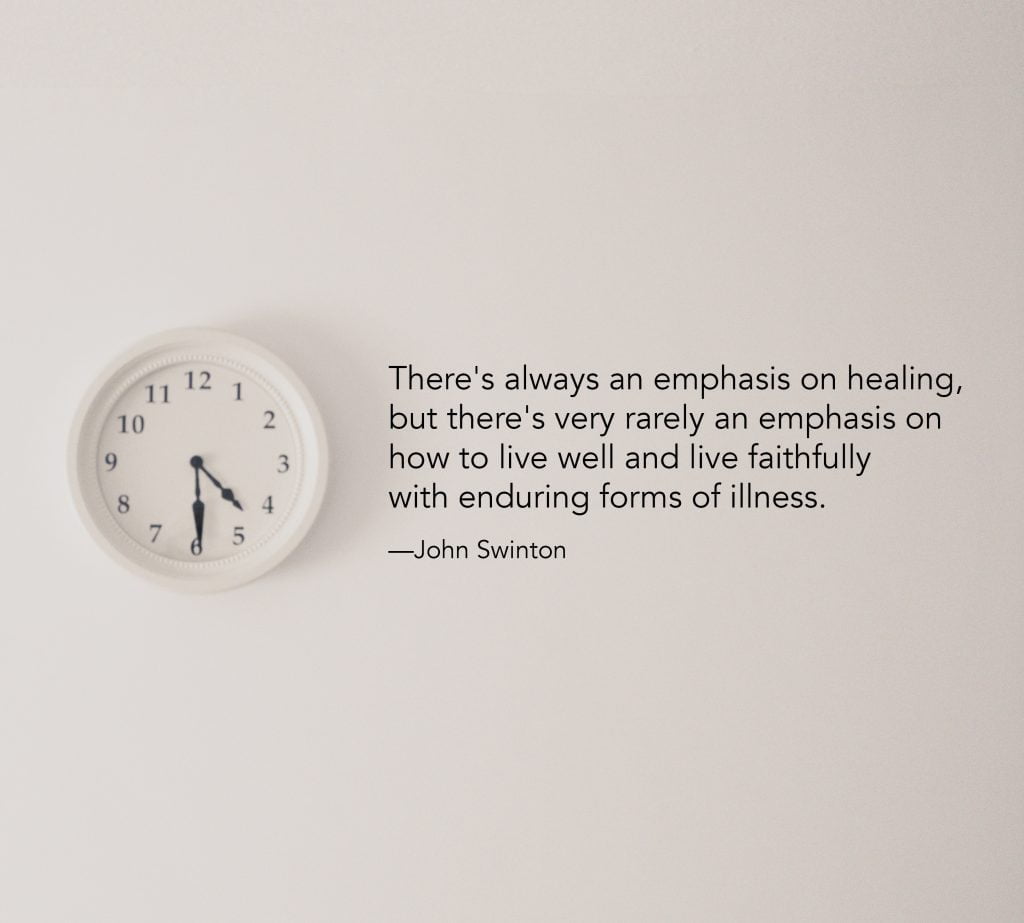Discussion Questions for John Swinton: The Speed of Love

1. Dr. John Swinton is an ordained minister and professor in practical theology and pastoral care, although he started out as a mental health nurse. For most of his life, his vocation has been to be present with people who see the world differently. Describe someone in your life who sees the world differently from you. What has being present with them taught you about your purpose?
2. A common fear Kate hears is that people are afraid of losing who they are to illness, injury, or disability. John says this is because we assume that we make sense of ourselves by our selves. What or who helps you make sense of yourself? What are you afraid of losing if you lose this narrative?
3. In John’s book, Becoming Friends with Time, he explores the gifts and limits of time, including St. Augustine’s estimation that time is a creature—that is, created by God rather than acting upon God. In this way, John thinks time has a different purpose than simply marking the completion of tasks. Instead, it is an invitation to participate in the re-creation of the world. What do you think this means?
4. Most people think of time as linear and progressive. But people with dementia, for instance, no longer “tense” time as past, present, or future. Being with them can remind us of the profundity of the moment. Think of a time you felt truly in the moment. What helped you to slow down and find space?
5. Sometimes, we don’t choose to slow down; we’re forced to slow down. “When you’re cast into that,” John says, “you have to grieve. You have to recognize there’s something lost before you can find the joy of that moment.” Have you ever grieved a speed of life no longer available to you? If so, describe how you marked it. If not, describe what might change if you did.
6. John was friends with the late Jean Vanier, founder of the L’Arche community in which people with intellectual disabilities live among friends. What John loved most about Jean was his gentleness, a hand hold here, a long stare there. What is something that you do or would like to do more gently?
7. One of Jean’s central beliefs was that the essence of who you are is discovered not in your intellect, but the heart. What does the heart symbolize for you? How have you been taught to value the heart—or not—by your upbringing, education, employment, and/or relationships?
8. When John’s friend Tonya lost her sense of self to a significant brain incident, she took the theological position that her true identity was found “in Christ” and therefore still had value. To make this feel real, she and her community ritualized the end of her old way of life and the beginning of the new in a lived funeral. Where does your true identity originate? What rituals—religious or otherwise—have made this feel real for you?
9. John talks about how, over the course of lives, and depending on our circumstances, we are actually just temporarily abled. This means that “people who have significant disabilities are not radically different from everybody else… we all are moving in that direction of becoming differently abled.” What are you temporarily able to do? What are you no longer able to do? Does thinking of yourself and others this way give you hope or despair, empathy or apathy, or something else?
10. Church can, for Kate, feel like an uncomfortable place to be fragile. Whether injury or illness (coffee or cats), “we’re bringing so many things though these doors,” Kate says, “we need our vision of community to be big enough to see them all.” What is your vision for a community that moves at the speed of love?
Bonus: After listening to this week’s podcast, what part of Kate and John’s conversation resonated with you most? What insight will you carry with you?
Discussion Questions written by author, editor, and facilitator Erin S. Lane.
Subscribe to Everything Happens wherever you listen to podcasts.


